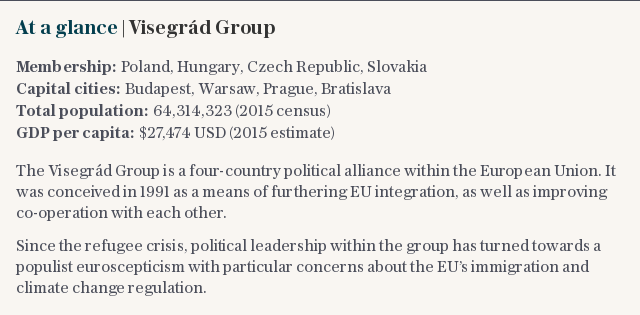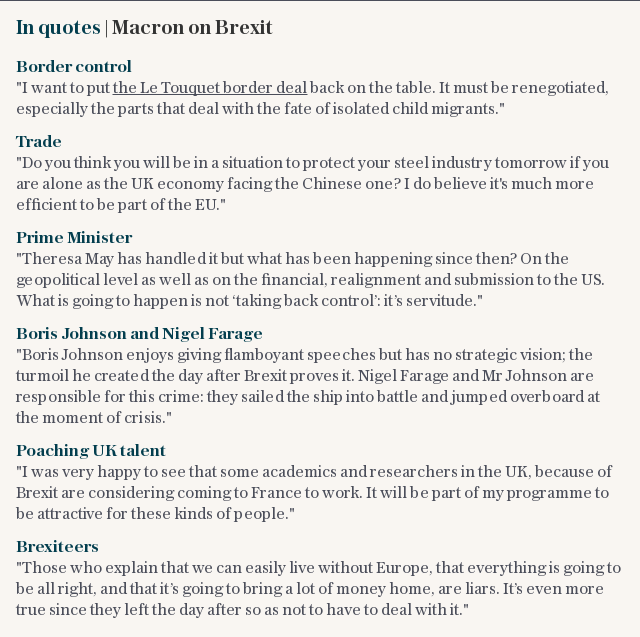May v Macron: five issues that will be sweep under the diplomatic carpet at key summit
Theresa May will host Emmanuel Macron at a summit at the Sandhurst military academy on Thursday, and as is customary on these occasions, there will be plenty of bilateral bonhomie on display as both sides. The pair will reaffirm the Franco-British relationship focusing on areas of defence, space technology, security, education and immigration.
Only the last of these will provide any hint of piquancy, since France is asking the UK to sign an additional protocol to the 2003 Le Touquet Accords that manage the Calais border which will probably see the UK accept more asylum seekers and pay more cash.
That has caused a predictable kerfuffle, but the truth is that Mr Macron has moved a long way from his campaign promise to rip up and renegotiate the Le Touquet agreements and the additional sums involved - “tens of millions of euros” - are peanuts, relatively speaking.
But behind the smiles and handshakes, there are other parts of the relationship that are distinctly more strained with Lord Ricketts, the former UK ambassador to Paris, warning this week that Brexit is increasing the risk of Britain and France “drifting apart”.
Here we look at what Mrs May and Mr Macron won’t be talking about - and why.
The Poland Question
Europe is currently locked in a potentially defining fight with Poland over accusations that it is traducing Western liberal values. Poland has now been formally accused under Article 7 of the EU treaties of carrying out anti-democratic reforms to the judiciary and media.
Mr Macron has egged on that fight as a means of highlighting, by contrast, his own idea to renew ‘core’ Europe after Britain leaves the bloc in 2019. He has accused Poland’s ultra-conservative Law and Justice ruling party of treating the EU like a “supermarket”, warning that Poland was placing itself on “the margins of Europe’s future history” adding that Poland was no longer a country “that can show Europe the way”.

Unfortunately, Mrs May has identified Poland as a potential new best friend for Britain after Brexit, showering Warsaw with diplomatic ‘love’. Before Christmas, in an unprecedented show of force, Mrs May went to Poland with her secretaries of Home, Defence and Foreign affairs.
A preliminary vote on the Polish question now looms in the European Council. The European left, including many of Mr Macron’s own supporters, will see the UK’s position as a test of its direction of travel after Brexit. Will Britain stand up for democratic integrity, or take a more realpolitik approach?
They see no contradiction in pushing bilateral defence cooperation and then systematically screwing us over in the Brexit talks. That’s the French way
Retired UK diplomat
This is very ticklish territory for Mrs May. And Mr Macron, thanks to his one-man missionary zeal for saving the soul of the European Union, is partly responsible for that.
The Brexit smash and grab raid on the City
As Jeremy Browne, the City's special representatives to the EU, warned last summer after a trip to Paris, the French actively intend to use Brexit to undermine London’s place as Europe’s financial capital.
The most recent example is fears of what the Financial Times this month dubbed a French “raid” on the City’s £8 trillion asset management business.
“They want disruption. They actively seek disaggregation of financial services provision,” Mr Browne wrote, a prediction that was subsequently borne out by hardline French positions in the phase one Brexit negotiations that rejected several attempts at compromise.
Expect Mr Macron to repeat his usual mantra that France must “defend Europe's long-term interests and the ‘special relationship’ between Britain and France” while continuing to aggressively pursue his goals.
This approach might seem somewhat contradictory, given Mr Macron’s clear desire to have access to UK military capabilities after Brexit; but experienced diplomats are not surprised. The French have what one calls “a remarkable capacity to compartmentalise”.
As another weary old British diplomatic hand puts it: “They see absolutely no contradiction at all in pushing bilateral defence cooperation - where there’s always been cooperation - and then systematically screwing us over in the Brexit talks. That’s the French way.”
Macron’s new best friend Donald Trump
Don’t mention ‘The Donald’! Given this summit is all about accentuating the positives of the Franco-British relationship, Mr Macron is unlikely to bring up the tender subject of the US president and Mrs May’s increasingly awkward relationship with him.
It’s not just - as French officials can’t resist pointing out - that the leader of the UK’s oldest ally has yet to visit Britain while he’s already been lavishly entertained at the Bastille Day Parade. That would be plain petty.
It’s more Mr Macron’s belief that he’s got Trump’s number. First by a show of force in gratuitously insulting the President at the Nato summit; then by flattering him with pomp and circumstance, while simultaneously lambasting him on Iran, Ukraine sanctions and the Paris climate accords.
Mrs May has sided with Europe on all those issues too, but Mr Macron’s Jupiterian halo largely often obscures this fact. At the same time Mrs May continues to walk a tightrope between preserving the UK’s future interests with the US after Brexit while trying to show Berlin, Paris and Brussels that the UK is not about to adopt a “Britain First” foreign policy.
As with Poland, Mr Macron is in danger of turning a shared European strategic dilemma (how to cope with the US’s turning inwards and re-orientation to the Asia Pacific) into a divisive local loyalty test designed with the French president’s self-aggrandisement firmly in mind. The British do not thank him for this.
A new (not so) special relationship
The government spin-doctors do their level best to argue that Mr Macron and Mrs May have a “strong working relationship”, noting that only Mr Macron was invited to Downing Street during the French presidential election campaign - even if the future French president did use the opportunity to declare open season on the City.
But in truth, no-one close to the pair expects much chemistry between the dogged Mrs May, with her tough lines on immigration and her injunctions against ‘citizens of nowhere’ and Mr Macron, the elite merchant banker who is both a globalist and a European protectionist all at the same time.

Internationally as Mrs Merkel's influence begins to fade, Mr Macron now seeks the role as ‘leader of the free world’ for himself. For her part, Mrs May has a justified reputation for ponderousness when it comes to dealing with fellow government heads, often sharing little more in private than can be found in a Downing Street press release.
There are those in Whitehall who indulge themselves momentarily, fondly imagining how a Macron-Blair or even a Macron-Cameron summit might have made the perfect cross-channel bromance, but they know these are mere dreams. For now at least, they can only ‘keep calm, and plod on’.
The united Franco-German front on Brexit
Mrs May and Mr Macron will make a play between the common destinies and shared histories of Britain and France, citing renewed defence co-operation after Brexit, but the danger is that this will feel mostly like lip-service.
It will be very hard to avoid the sense that at a moment when France and Germany are so obviously wedded to renewing the relationship that is the true “motor” of Europe - an engine that has been stalled of late - the Franco-British relationship is a risk of becoming a sideshow.
If Mr Macron manages to enact his vision for a new ‘core’ Europe, a project actively designed to marginalise Britain and Poland if they will not, in their different ways, play by the rules of the club, then diplomats warn Britain may be left with no choice but to assess its interests as lying elsewhere.
No-one should doubt Mr Macron’s hard-headedness in this calculation - he bets that Poland and Eastern Europe will have no choice but to knuckle under (where else do they have to go, Paris reasons, ‘to the Russians’?) - and the UK, when faced with hard Brexit choices, will ultimately come to heel too.
That is why France and Germany are so jointly determined to hold the line against UK ‘cherry-picking’ after Brexit, even when other EU countries that face short-term losses from Brexit urge a more pragmatic approach.
As Mrs May stands all smiles next to Mr Macron on Thursday she will know that it is that apparent lack of Franco-German flexibility that may yet seal her own personal political fate.

 Yahoo News
Yahoo News 
